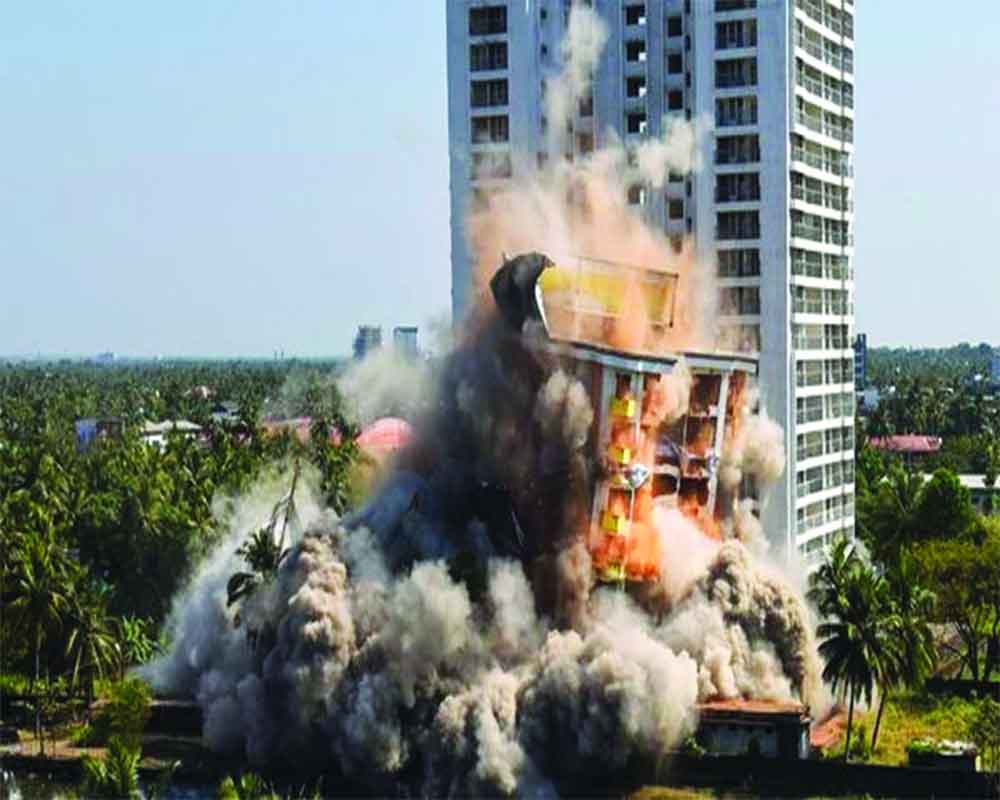If Kerala has to survive as God’s own country, then it has to protect its fragile ecosphere from illegal development
The sight of four gigantic residential towers, built across a rich coastal ecosystem in Kochi’s Maradu, crumbling down like a pack of cards, was not just about the grossest violation of law but a cruel joke on home buyers. For they had invested their money as their unscrupulous realtors, believed to be in cahoots with local Government officials and politicians, made them believe their dream of living on a marina. And 10 years into their settled and charmed lives, all was gone. Though timely evacuation and appropriate compensation by the Kerala Government have provided some succour, it cannot be denied that they have been cheated and become gullible targets of the builder-administration nexus. It is in this sense that the Supreme Court’s demolition order, which was complied by the Kerala Government this week, serves as a deterrent in the real estate sector in the country in general, besieged as it is by corruption and malpractice. It also marks a paradigm shift in the way we treat our environment vis-a-vis development and becomes a template on what we should not do hereon. For Kerala, which has consolidated its tourism industry around the virginal and natural appeal of “God’s own country,” one that has triggered waterfront development, is at its worst phase of biosphere destruction. It is, therefore, imperative that its fragile balance be protected and made sustainable. The towers were situated on the shores of the Vembanad wetland, which strictly falls in the restricted zone under the provisions mandated by the Coastal Regulation Zone (CRZ). The limits set by the Ministry of Environment, Forest and Climate Change, which called for construction activities to be 50 metres away from the backwaters and mangrove forests and 20 metres away on islets, were flouted with impunity. According to the State Government’s own estimates, there are around 26,330 illegal buildings in 10 districts alone. As the dust of wrongdoings rises from the debris of the demolitions at Maradu, it’s not just the builders but political leaders responsible for the clearances, who must face the music.
The consecutive floods in the State have been indication enough of how illegal encroachments in the fragile backwaters have blocked the flow of natural waterways and forced a crisis every monsoon. This has already dented the tourism business badly, which contributes 12 per cent to the State’s GDP pie. The current demolition drive may force a number of projects to either scale down or shut shop altogether. With most resorts and hotels being built along river banks, they, too, may have to make changes. They must understand that undoing a wrong can prove more costly than a course
correction. And as much as land may be a challenge for the State, it just cannot afford shortcuts to jeopardise what sells most, its pristine coastline. The State seems to have got entangled in a web of its own making. A way has to be found out that involves reducing the over-dependence on tourism and looking at offsetting it with a boost to small and medium enterprises and setting up R&D and IT hubs. The alternative alone can wipe the grime of Maradu.
(Courtesy: The Pioneer)








 OpinionExpress.In
OpinionExpress.In















Comments (0)